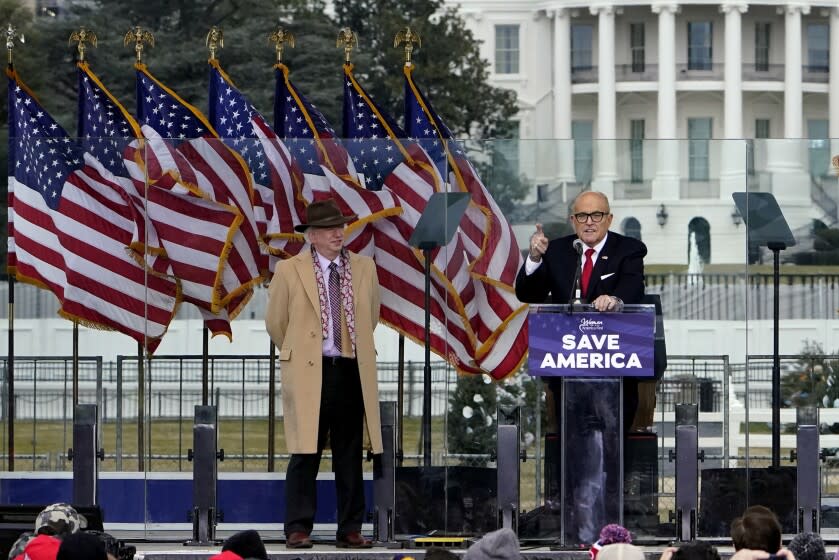Judge rules against Trump lawyer John Eastman in dispute with Jan. 6 investigators

- Oops!Something went wrong.Please try again later.
- Oops!Something went wrong.Please try again later.
A federal judge on Wednesday handed an incremental victory to the congressional panel investigating the Jan. 6 insurrection in a case involving California attorney John Eastman.
Eastman, who advised former President Trump on efforts to overturn the results of the 2020 presidential election, has been fighting to prevent the committee from seeing more than 100 emails involving him.
The judge ruled against Eastman for now, saying the court would review the documents to determine which can be turned over to the panel.
Eastman has emerged as a central figure in the committee's investigation into Trump's efforts to subvert the election results.
He wrote two legal memos arguing that Vice President Mike Pence had the authority to unilaterally reject electoral votes or delay their counting, which could have opened the door for Republican-led state legislatures to cast their votes for Trump even though more voters cast their ballots for Joe Biden. The advice was disregarded by Pence and roundly denounced by legal experts when it became public last year.
The congressional committee subpoenaed emails sent or received by Eastman from Jan. 4 to Jan. 7, 2021.
Eastman sued to block release of the documents, which are housed on the server of Chapman University in Orange, which was Eastman's employer at the time. He argued that they're protected from disclosure by attorney-client privilege and related legal rules.
The judge rejected that blanket claim.
"After reading the emails, the Court will determine for each document whether any privilege existed, whether that privilege was waived, and whether any exceptions apply," wrote U.S. District Judge David O. Carter, who is based in Santa Ana.
"Ultimately, the Court will issue a written decision including its full analysis and its final determination of which, if any, documents must be disclosed to the Select Committee."
The committee had argued for the court review of 111 disputed emails in a hearing on Tuesday, which also offered more insight into the panel's theory of potential criminal charges against Trump, which was first revealed last week in a court filing pertaining to Eastman's lawsuit.
In that filing, the committee alleged that the emails it was seeking from Eastman could show that Trump broke multiple laws by seeking to block the certification of Biden's win despite knowing that his claims of fraud were unfounded.
The committee said attorney-client privilege between Eastman and Trump would not apply to evidence demonstrating crime or fraud.
Charles Burnham, an attorney for Eastman, acknowledged in the hearing it was likely the judge would review the documents and tamped down expectations the emails would reveal blatant wrongdoing.
"There’s not going to be an email where anyone involved in the campaign effort says, 'We’ve got to have some ruffians rush the Capitol if the vice president doesn’t make the decision we want.' It's not going to be there," Burnham said.
"There's not going to be an email that says, 'We all know the election had no fraud or illegality, but we've got to come up with something.'”
Douglas Letter, counsel for the House select committee, said while they didn't expect the emails would show such flagrant violations, there was already information that points to fraud or criminal intent.
He cited an email to Pence's counsel, Greg Jacob, in which Eastman said Trump had been advised there was nothing supporting his allegations of electoral fraud, but "once [Trump] gets something in his head, it's hard to get him to change course."
"That's pretty strong evidence ... that Trump was ignoring all of the very clear evidence because he wanted something different," Letter said. "He wanted the vice president to do something that was plainly against the Constitution.
Carter, in his order, did not address the committee's allegations of criminal or fraudulent activity. He said the panel raised sufficient questions about whether Eastman's emails would be shielded under attorney-client privilege or as work product made in anticipation of a lawsuit.
While the ruling advances the committee's efforts, Carter noted that "reading the emails does not mean that the Court will ultimately require disclosure." The order did not specify when it will determine which emails should be turned over to congressional investigators.
The hearing also involved an attorney for Chapman University, where Eastman served as law professor and onetime dean of the law school.
An uproar over Eastman's involvement with Trump, including his appearance at a pro-Trump rally immediately preceding the insurrection at the Capitol, prompted the professor to retire abruptly one week after Jan. 6.
This story originally appeared in Los Angeles Times.

